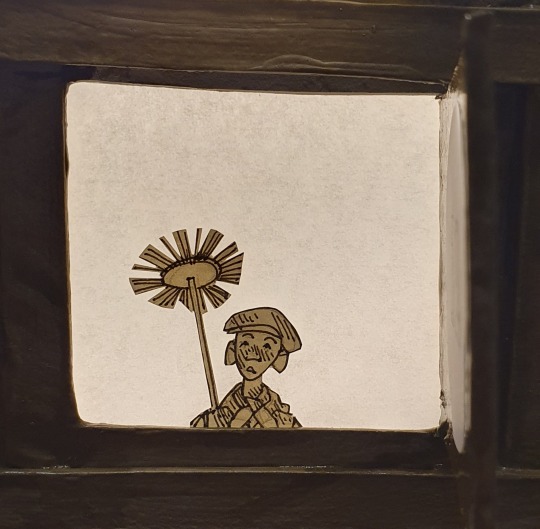#petit-gervais
Explore tagged Tumblr posts
Text
LES MIS CHARACTERS THAT DESERVE MORE ATTENTION
Monsieur Mabeuf
I CANNOT stress this enough, I LOVE him. He's just this nice old man that likes plants and books, what MORE do you want??
Azelma
I don't care if Victor Hugo didn't care enough to give her a storyline like her sister, I CARE and so should YOU
Madame Houcheloup
I think she deserves it, with all that shit she went through plus auntie figure for les amis
Dahlia, Favourite and Zéphine
I just feel like we completely forgot about them as a whole after Tholomyes happened but they have SO much potential + Fantine deserves to have girlfriends
Georges Pontmercy
Yeah, yeah, he's supposed to be dead but so are Les Amis and we all sure don't seem to mind that. I know we love the whole 'Marius doesn't have a dad now' thing because you know, angst, but come on!
Patron-Minette
Montparnasse gets attention, why shouldn't the other silly criminals get some too?
Petit-Gervais
He is Feuilly, I'm sorry, if you don't believe me, you're wrong, take a look at my research
Bonus: That one feminine guy Eponine swapped clothes with before she went down to the barricades
I know, far fetched, but we can do SO MUCH with this
#les mis#les amis#les miserables#les amis de l'abc#mabeuf#azelma thénadier#azelma#Madame Houcheloup#Fantine#Zephine#Dahlia#Favourite#georges pontmercy#marius pontmercy#patron minette#montparnasse#eponine#eponine thenardier#feuilly#petit-gervais
88 notes
·
View notes
Text
Petit Gervais is actually the most relatable chapter of Les Mis because sometimes you really are having the most insane time, like the most confused you’ve ever been, and then there’s just some kid there.
210 notes
·
View notes
Text

i puzzled over this for a long time.......and then i realised:

i have to ask: does. does this person somehow think...that javert and petit gervais are. the same person?
#i'm honestly wracking my brain trying to think of what else they might have meant by this#i'm coming up empty#what else could it mean???#please tell me if i'm missing something?#either way i've had a good laugh about it#petit gervais#javert#les mis#les miserables#les misérables#les mis reviews#les mis shitposts#sylvie's own nonsense
341 notes
·
View notes
Text
So devasting to me that Gavroche and Petit Gervais were separated by both time and space, they should have been besties
82 notes
·
View notes
Text
Pictures taken seconds before a convict robs you of your forty-sous piece:

#les mis letters#les mis#lm 1.2.13#petit gervais!!! don’t do it!!!#why didn’t your marmot protect you
99 notes
·
View notes
Text

"Well, but how is this? I gave you the candlesticks too, which are of silver like the rest, and for which you can certainly get two hundred francs. Why did you not carry them away with your forks and spoons?"
#Les Miserables#Victor Hugo#Jean Valjean#The lesson may not take right away but it certainly plants the seeds for when he has his encounter with poor Petit Gervais
368 notes
·
View notes
Text


Fresh from @lesmisletters: Petit Gervais, his canon (!!) marmot and his entire pokemon party, as told by various translators
French: ...sa vielle au flanc et sa boîte à marmotte sur le dos...
Hapgood: ... his marmot-box on his back.
Several other translators, for some godforsaken reason: he's carrying a... cherrywood box! a guinea pig in a cage! a dormouse box! a... cricket!
#les miserables#lm 1.2.13#les mis letters#petit gervais#jean valjean#fanart#of sorts#guinea pig and cricket come from polish translations. no polish translation I found so far got it right </3
34 notes
·
View notes
Text
201 notes
·
View notes
Text
Barricade Day Advent Calendar
Day 9: Petit-Gervais

103 notes
·
View notes
Note
OKAY SO.
Savoyard migrants (of both sexes) trained marmots to 'dance' and performed with them in cities.
This was so iconic that Savoyard peasants themselves came to be called marmottes.
The iconic fashion of Savoyard peasant women, a kerchief tied under the chin, also came to be called a marmotte.
I think marmotte may also have meant prostitute for a while? The linked article mentions the change in the association of marmotte-the-headscarf from pastoral purity to risque worldliness but doesn't say anything about the word itself, but I'm pretty sure I've read that somewhere (and honestly most French animal words seem to be able to mean 'sex worker' anyway).
And Savoyard marmot-trainers carried their animals in a rectangular wooden case, which also came to be called a marmotte!
So Petit-Gervais is first described as un petit savoyard d'une dizaine d'années qui chantait, sa vielle au flanc et sa boîte à marmotte sur le dos--so that could be a traveling case or an animal carrier with an actual marmot.
When he accosts the curé, Jean Valjean calls him un petit d'environ dix ans qui a une marmotte, je crois, et une vielle. Il allait. Un de ces savoyards, vous savez?
So again, possibly the box and possibly the animal. They are in the Alps, and there was an actual marmot turning on the spit at the Croix-de-Colbas, so maybe the assumption is that a marmot box in these parts is likely to contain an actual marmot? But I don't think we know.
This is driving me crazy. In the brick I swear Gavroche has a weird little unidentifiable creature he carries around. Something like a rat or a frog. It’s got a name along the lines of the thing or the creature. I can’t find the passage that mentions it, though, do you have any idea?
Gavroche doesn't have a creature, alas (though it would be awesome if he did)! He mentions having had a cat once (but the rats ate it D:) ,
I can think of two other things that you might be thinking of instead?
1- Petit Gervais carries around a marmot in a box-- sa boîte à marmotte sur le dos
2- during the Gamin chapters that being Tome III, Hugo mentions their specific fauna-- that they love the death's head aphid, and:
Il a son monstre fabuleux qui a des écailles sous le ventre et qui n'est pas un lézard, qui a des pustules sur le dos et qui n'est pas un crapaud, qui habite les trous des vieux fours à chaux et des puisards desséchés, noir, velu, visqueux, rampant, tantôt lent, tantôt rapide, qui ne crie pas, mais qui regarde, et qui est si terrible que personne ne l'a jamais vu; il nomme ce monstre «le sourd». Chercher des sourds dans les pierres, c'est un plaisir du genre redoutable. He has his fabulous monster which has scales under its belly and which is not a lizard, which has pustules on its back and which is not a toad, which inhabits the holes of old lime kilns and desiccated sumps. , black, hairy, slimy, crawling, sometimes slow, sometimes rapid, which does not shout, but looks, and which is so terrible that no one has ever seen it; he calls this monster "The Deaf Thing". Looking for the Deaf Thing in the stones is a formidable pleasure.
Obviously they only "have" this creature in the sense of having the legend, but I definitely see where it could be remembered as being a pet ! It's a delightful idea, though-- Let Gavroche Have a Tiny Monster! :D
If it's neither of those things you're remembering, I'm stumped!
146 notes
·
View notes
Text





dw guys I HAVE actually been drawing....just dunno how or when to post them so . Take this!!
#les mis#les mis fanart#enjolras#jean valjean#joly#bahorel#grantaire#petit gervais#monsieur thenardier#most of these were seen by discord first :3
35 notes
·
View notes
Text
Happy Petit Gervais day to all who celebrate
14 notes
·
View notes
Text
The case of Petit Gervais, manga.
A)



B)



C)




Fun fact about B is that Jean Valjean didn't know he actually stole a coin until P.M. leaves. He literally says, "I've ended up becoming a criminal again!" And that's funny to me.
A) Arai Takahiro
B) Team Banmikasu
C) Minamoto Tarou
13 notes
·
View notes
Text
crying in the club about petit gervais
7 notes
·
View notes
Text
was doing the hunger game simulator with les mis characters and

#holy shit#petit gervais#les miserables#broadway#les mis#enjoltaire#grantaire#victor hugo#vicky hugo
31 notes
·
View notes
Text

5 notes
·
View notes